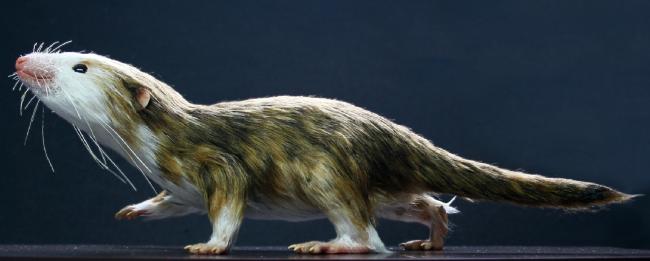
Tiny fossils reveal how shrinking was essential for successful evolution: Study
Birmingham, Sept 17 (IBNS): Getting smaller was a key factor contributing to the exceptional evolution of mammals over the last 200 million years, according to a new study published today in Nature.
The origin of modern mammals can be traced back more than 200 million years to the age of dinosaurs. But while dinosaurs evolved to become some of the largest land animals, for the following 150 million years, the ancestors of all modern mammals pursued an entirely different strategy: getting very small.
An international team of scientists from the UK and the US have used modern computer analysis to take a look at what happened to the skeleton of our tiny mammal ancestors.
The international team of collaborators on this research was led by Dr Stephan Lautenschlager at the University of Birmingham (UK) and includes Professor Zhe-Xi Luo (University of Chicago, USA), Dr Pamela Gill (University of Bristol, UK) and Professor Michael Fagan (University of Hull, UK).
Modern mammals are unique in having a lower jaw consisting of just a single bone that bears teeth.
In contrast, all other vertebrates possess complex lower jaws formed by at least five or more bones joined together. In the course of evolution, fossils show that the lower jaw of mammalian ancestors became simplified and a new jaw joint was formed, while some of the other bones moved into the middle ear to aid in hearing.
The team’s research focussed on the long-standing question of how it was possible to simplify and restructure the lower jaw, while still being able feed and hear. Using X-ray computed tomography (CT) scanning of several fossil skulls and lower jaws, the researchers generated digital models which were subjected to different computer simulations.
Their results showed that the small size of the fossil mammals significantly reduced the stresses in the jaw bones when feeding, while still being powerful enough to capture and bite through prey, such as insects.
Dr Stephan Lautenschlager, lead author and lecturer at the University of Birmingham, said: "Our results provide a new explanation of how the mammalian jaw evolved over 200 million years ago. Getting very small appears to have been crucial for our mammalian ancestors. This allowed them to reduce the stresses in the jaw during feeding and made the restructuring of the jaw bones possible.”
Professor Emily Rayfield from the University of Bristol who led the study added: “The evolution of the mammalian jaw joint has perplexed palaeontologists for over 50 years. Using computational methods we can offer explanations to how our mammalian ancestors were able to maintain a working jaw while co-opting bones into a complex sound detection system. Our research is about testing ideas of what makes mammals unique among the animal kingdom, and how this may have come about.”
The research was carried out at the University of Bristol and funded by the Natural Environment Research Council, UK.
Support Our Journalism
We cannot do without you.. your contribution supports unbiased journalism
IBNS is not driven by any ism- not wokeism, not racism, not skewed secularism, not hyper right-wing or left liberal ideals, nor by any hardline religious beliefs or hyper nationalism. We want to serve you good old objective news, as they are. We do not judge or preach. We let people decide for themselves. We only try to present factual and well-sourced news.







